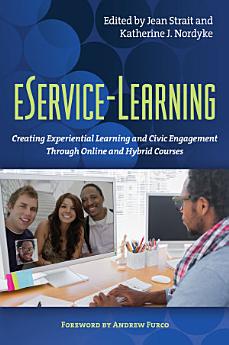eService-Learning: Creating Experiential Learning and Civic Engagement Through Online and Hybrid Courses
Jean R. Strait · Katherine Nordyke
Jul 2023 · Taylor & Francis
Ebook
192
Pages
family_home
Eligible
info
reportRatings and reviews aren’t verified Learn More
About this ebook
This book serves as an introduction to using online teaching technologies and hybrid forms of teaching for experiential learning and civic engagement. Service-learning has kept pace neither with the rapid growth in e-learning in all its forms nor with the reality that an increasing number of students are learning online without exposure to the benefits of this powerful pedagogy.Eservice-learning (electronic service-learning) combines service-learning and on-line learning and enables the delivery of the instruction and/or the service to occur partially or fully online. Eservice-learning allows students anywhere, regardless of geography, physical constraints, work schedule, or other access limitations, to experience service-learning. It reciprocally also equips online learning with a powerful tool for engaging students.In eservice-learning, the core components of service, learning, and reflection may take a different form due to the online medium—for example, reflection often occurs through discussion board interactions, journals, wikis, or blogs in an eservice-learning course. Moreover, the service, though still community-based, creates a world of opportunities to connect students with communities across the globe—as well as at their very own doorstep.This book introduces the reader to the four emerging types of eservice-learning, from Extreme EService-Learning (XE-SL) classes where 100% of the instruction and 100% of the service occur online, to three distinct forms of hybrid where either the service or the instruction are delivered wholly on-line – with students, for instance, providing online products for far-away community partners – or in which both are delivered on-site and online. It considers the instructional potential of common mobile technologies – phones, tablets and mobile reading devices. The authors also address potential limitations, such as technology challenges, difficulties sustaining three-way communication among the instructor, community partner, and students, and added workload.The book includes research studies on effectiveness as well as examples of practice such drafting grants for a community partner, an informational technology class building online communities for an autism group, and an online education class providing virtual mentoring to at-risk students in New Orleans from across the country.
About the author
Jean R. Strait is Director of the Center for Excellence in Urban Teaching. She brings a wealth of first-hand experience in the classroom—having taught reading, literacy, and educational psychology in higher education for the past 20 years. She has also developed and led urban teacher programs with service-learning components at two-year and four-year colleges throughout the Twin Cities. In addition, Dr. Strait has created programs to train adults in the Dakota Language and has helped refugee teachers become licensed in Minnesota. “Literacy is at the heart of all my teaching,” she says. Katherine Nordyke is Director, Citizenship and Service Learning, Citizenship and Service Learning, Missouri State University. Andrew Furco is Associate Vice President for Public Engagement at the University of Minnesota, where is also serves as an Associate Professor of Higher Education. His research studies have explored the role of community engagement in K-12 and higher education, both in the U.S. and abroad. His publications include the books Service-Learning: The Essence of the Pedagogy (with. S. Billig), Service-Learning Through a Multidisciplinary Lens (with S. Billig), and Service-Learning: Does it Measure Up (with V. Jagla and J. Strait). Prior to arriving in Minnesota, he served as a faculty member in the Graduate School of Education at UC Berkeley and as Director of Berkeley’s Service-Learning Research and Development Center. He currently serves as a board member of the International Association for Research on Service-Learning and Community Engagement (IARSLCE).
Rate this ebook
Tell us what you think.
Reading information
Smartphones and tablets
Install the Google Play Books app for Android and iPad/iPhone. It syncs automatically with your account and allows you to read online or offline wherever you are.
Laptops and computers
You can listen to audiobooks purchased on Google Play using your computer's web browser.
eReaders and other devices
To read on e-ink devices like Kobo eReaders, you'll need to download a file and transfer it to your device. Follow the detailed Help Center instructions to transfer the files to supported eReaders.






